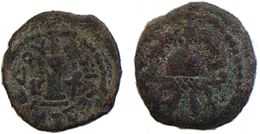Prutah
From Wikipedia, the free encyclopedia

Eight prutah coin of Herod the Great

Prutah of John Hyrcanus (134 BCE to 104 BCE).
Obv: Double cornucopia.
Rev: Five lines of ancient Hebrew script; reading "Yehochanan Kohen Gadol Chever Hayehudim" (Yehochanan the High Priest, Council of the Jews.
Obv: Double cornucopia.
Rev: Five lines of ancient Hebrew script; reading "Yehochanan Kohen Gadol Chever Hayehudim" (Yehochanan the High Priest, Council of the Jews.
Prutah (Hebrew: פרוטה) is a word borrowed from the Mishnah and the Talmud, in which it means "a coin of smaller value". The word was probably derived originally from an Aramaic word with the same meaning.
The prutah was an ancient copper Jewish coin worth about one thousandth of a pound. A loaf of bread at that time was worth about 10 prutot (plural of prutah). One prutah was also worth two lepta (singular lepton), which was the smallest denomination minted by the Hasmonean and Herodian Dynasty kings.
Prutot were also minted by the Roman Procurators of the Province of Judea, and later were minted by the Jews during the First Jewish Revolt (sometimes called 'Masada coins').[1]
See also
- Hashmonean coinage
- Coins of Alexander Jannaeus
- Herodian coinage
- Roman Procurator coinage
- First Jewish Revolt coinage
- Bar Kochba Revolt coinage
- List of historical currencies
- ma'ah
- Zuz
- Shekel
- Israeli pruta
- Penny
References
External links
This article is issued from Wikipedia. The text is available under the Creative Commons Attribution/Share Alike; additional terms may apply for the media files.